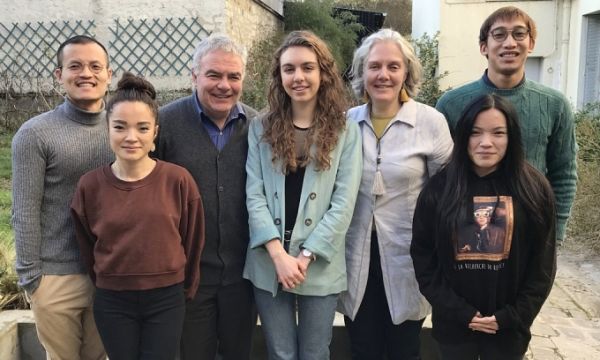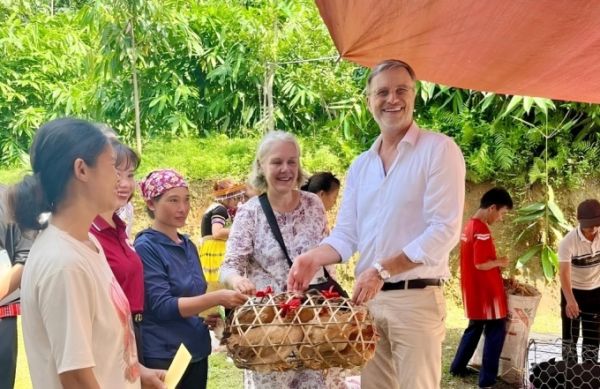
Cavalier was born with a congenital uterine defect and suffered several miscarriages before her condition made it impossible to have children.
In 1993 she and her husband Jean-Paul, a physical therapist and a financial expert, visited an orphanage in Can Tho City and adopted twin girls with hydrocephalus among many war-affected children.
The 58-year-old woman from Yvelines Province says: “It was both joy and heartbreak. In that moment I knew my life would be forever tied to Vietnam.”
For the first two months after the adoption Children’s Hospital 2 in HCMC became their home as the twins underwent treatment.
In the following years they spent a lot of time at Necker Hospital in Paris for their children’s respiratory therapy. “While Paris sparkled with lights to celebrate Christmas, I was holding my daughter Aurélia in the emergency room,” she recalls.
In 1995 Cavalier and her husband adopted a third child, Benoit, from a center in HCMC. When she returned to France and left the boy in her husband’s care for 10 days, Benoit became silent and withdrawn out of fear of being abandoned.
“That fear stayed with him for many years,” she says.
Their fourth adopted child, Hugo, joined the family in 1998. Born prematurely at 30 weeks and weighing only 1.2 kilograms, he spent two months in an incubator and could not lift his head at five months. Her husband performed physical therapy on their son daily.
Hugo later underwent years of respiratory, speech and motor therapy. He learned to walk at two and needed medication to control hyperactivity.
|
Florence Cavalier’s four Vietnamese adopted children and her newborn daughter Héloïse in 2003. Photo courtesy of the family |
After adopting the four Vietnamese children, she unexpectedly became pregnant and gave birth to a daughter, Héloïse, in 2003.
Benoit, then seven, feared being abandoned now that his parents had a biological child. When Cavalier returned from the hospital, he had packed his things, ready to leave. She focused on helping him adjust.
Family trips and shared evening gradually helped the siblings bond. The older children grew to accept their youngest sister.
She says: “I breastfed Héloïse until she was one, and the older siblings were curious to try. I let each of them have a taste as a way to bond.”
Today Hugo is a robotics engineer, Benoit runs a software business, twins Aurélia and Marie work in human resources and commerce at major corporations, and Héloïse studies veterinary medicine.
|
Florence Cavalier and her husband Jean-Paul with their four Vietnamese adopted children and biological daughter in 2025. Photo courtesy of the family |
Cavalier’s commitment to Vietnamese children did not stop with her own family. Raising her children inspired her to help others.
In 2007 she founded Enfance Partenariat Vietnam (EPVN) with some 50 members, mostly people who adopted Vietnamese kids, to support orphaned and disabled children.
With 14 years of social work experience at the Council for family in Yvelines, Paris, she organized visits to and projects at orphanages in Bac Giang and Vung Tau.
The group has also built roads and schools, brought clean water to villages, donated livestock, and started vocational classes to help poor families.
In the last five years EPVN has contributed some US$1 million to improve education, healthcare and livelihoods in Vietnam.
“I will never forget the meal I had in Ta Phin, Sapa, when a family slaughtered a pig to thank us, or when another family gave a calf to a poorer household or the simple fruits the Ba Na people offered with so much warmth,” she says.
 |
|
Florence Cavalier and France’s ambassador to Vietnam, Olivier Brochet, donate sows and hens to poor families in Khuoi Chau Village, Vi Xuyen District, Ha Giang, now part of Tuyen Quang Province, in July 2025. Photo courtesy of EPVN |
Jean-Paul has always supported his wife. Florence once contracted cholera while doing charity in Vietnam and was hospitalized. “In July 2024, she nearly fainted in the heat while donating sows in Vi Xuyen,” he says.
She encourages her children to stay connected to their roots.
Aurélia volunteered in Bac Giang, Marie helped students build bamboo trash bins, Hugo paved two kilometers of concrete road and learned traditional medicine from a Dao Do family, and Héloïse traveled to Vietnam three times with her mother and veterinary students.
Hugo is the most connected to Asia: He loves Asian cuisine, travels often and once dreamed of marrying an Asian woman. That dream will come true on Sept. 13, when he will marry a Korean adoptee.
Since sending her first batch of medical equipment to Tu Du Hospital in HCMC in 1993, Cavalier and EPVN have given thousands of Vietnamese children and families better access to education, healthcare, and a stable life. Her motivation she says is to “help the poorest and sickest people.”
As Vietnam celebrated its 80th National Day this summer, she received the Friendship Order in recognition of her humanitarian efforts with Vietnamese children during her 80th visit to the country.
“This award marks 32 years of my working with EPVN,” she says.
People often ask her “Why does a Frenchwoman have such a strong bond with Vietnam?” Her reply? “Because Vietnam gave me the chance to become a mother.”